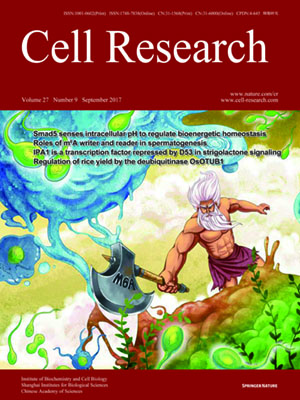
Volume 27, No 9, Sep 2017
ISSN: 1001-0602
EISSN: 1748-7838 2018
impact factor 17.848*
(Clarivate Analytics, 2019)
Volume 27 Issue 9, September 2017: 1100-1114
ORIGINAL ARTICLES
Mettl3-mediated m6A regulates spermatogonial differentiation and meiosis initiation
Kai Xu1,5,*, Ying Yang2,*, Gui-Hai Feng1,*, Bao-Fa Sun2,*, Jun-Qing Chen1,3,*, Yu-Fei Li1,5, Yu-Sheng Chen2,5, Xin-Xin Zhang1,5, Chen-Xin Wang1,5, Li-Yuan Jiang1,5, Chao Liu1,5, Ze-Yu Zhang4,5, Xiu-Jie Wang4,5, Qi Zhou1,5, Yun-Gui Yang2,5 and Wei Li1,5
1State Key Laboratory of Stem Cell and Reproductive Biology, Institute of Zoology, Chinese Academy of Sciences, Beijing 100101, China
2Key Laboratory of Genomic and Precision Medicine, Collaborative Innovation Center of Genetics and Development, CAS Center for Excellence in Molecular Cell Science, Beijing Institute of Genomics, Chinese Academy of Sciences, Beijing 100101, China
3State Key Laboratory of Reproductive Medicine, Department of Histology and Embryology, Nanjing Medical University, Nanjing, Jiangsu 210029, China
4Key Laboratory of Genetic Network Biology, Collaborative Innovation Center of Genetics and Development, Institute of Genetics and Developmental Biology, Chinese Academy of Sciences, Beijing 100101, China
5University of Chinese Academy of Sciences, Beijing 100049, China
Correspondence: Wei Li, E-mail: liwei@ioz.ac.cn; Yun-Gui Yang, E-mail: ygyang@big.ac.cn; Qi Zhou,(qzhou@ioz.ac.cn)
METTL3 catalyzes the formation of N6-methyl-adenosine (m6A) which has important roles in regulating various biological processes. However, the in vivo function of Mettl3 remains largely unknown in mammals. Here we generated germ cell-specific Mettl3 knockout mice and demonstrated that Mettl3 was essential for male fertility and spermatogenesis. The ablation of Mettl3 in germ cells severely inhibited spermatogonial differentiation and blocked the initiation of meiosis. Transcriptome and m6A profiling analysis revealed that genes functioning in spermatogenesis had altered profiles of expression and alternative splicing. Our findings provide novel insights into the function and regulatory mechanisms of Mettl3-mediated m6A modification in spermatogenesis and reproduction in mammals.
10.1038/cr.2017.100
FULL TEXT | PDF
Browse 1279


